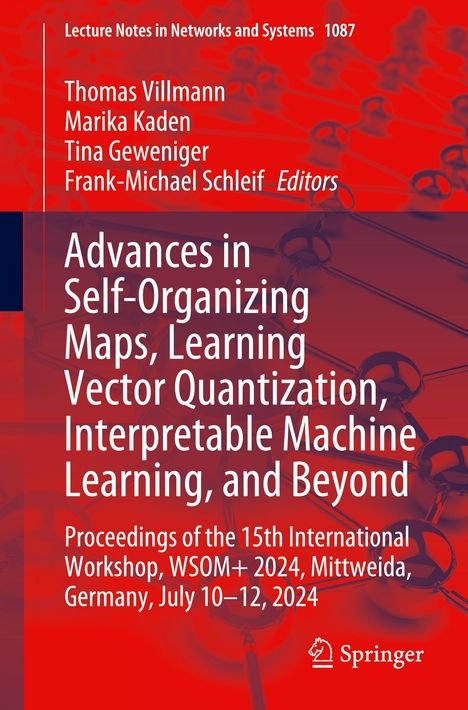Advances in Self-Organizing Maps, Learning Vector Quantization, Interpretable Machine Learning, and Beyond, Kartoniert / Broschiert
Advances in Self-Organizing Maps, Learning Vector Quantization, Interpretable Machine Learning, and Beyond
- Proceedings of the 15th International Workshop, WSOM+ 2024, Mittweida, Germany, July 10-12, 2024
(soweit verfügbar beim Lieferanten)
- Herausgeber:
- Thomas Villmann, Marika Kaden, Tina Geweniger, Frank-Michael Schleif
- Verlag:
- Springer, 08/2024
- Einband:
- Kartoniert / Broschiert, Paperback
- Sprache:
- Englisch
- ISBN-13:
- 9783031671586
- Artikelnummer:
- 11937064
- Umfang:
- 244 Seiten
- Gewicht:
- 376 g
- Maße:
- 235 x 155 mm
- Stärke:
- 14 mm
- Erscheinungstermin:
- 2.8.2024
- Hinweis
-
Achtung: Artikel ist nicht in deutscher Sprache!
Klappentext
The book presents the peer-reviewed contributions of the 15th International Workshop on Self-Organizing Maps, Learning Vector Quantization and Beyond (WSOM$+$ 2024), held at the University of Applied Sciences Mittweida (UAS Mitt\-weida), Germany, on July 10-12, 2024.
The book highlights new developments in the field of interpretable and explainable machine learning for classification tasks, data compression and visualization. Thereby, the main focus is on prototype-based methods with inherent interpretability, computational sparseness and robustness making them as favorite methods for advanced machine learning tasks in a wide variety of applications ranging from biomedicine, space science, engineering to economics and social sciences, for example. The flexibility and simplicity of those approaches also allow the integration of modern aspects such as deep architectures, probabilistic methods and reasoning as well as relevance learning. The book reflects both new theoretical aspects in this research area and interesting application cases.
Thus, this book is recommended for researchers and practitioners in data analytics and machine learning, especially those who are interested in the latest developments in interpretable and robust unsupervised learning, data visualization, classification and self-organization.
Biografie (Thomas Villmann)
Die vorliegende Arbeit entstand im wesentlichen am Institut für Informatik der Universität Leipzig in der Forschungsgruppe Neuroinformatik, der der Autor von 1991 bis 1994 angehörte. Sie wurde 1996 als Dissertationsschrift angenommen, der Betreuer war Dr. habil. Ralf Der. Neben der Theorie und Anwendung neuronaler Netze arbeitet der Autor auf den Gebieten Genetische Algorithmen, maschinelle Lernverfahren, Optimierung und Statistik.

